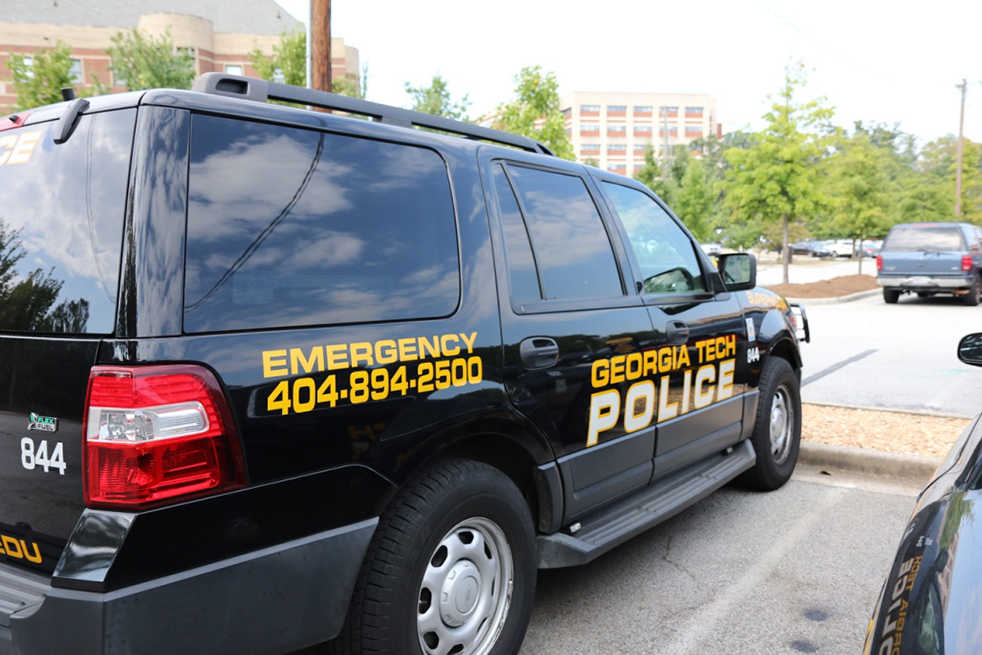The “Tech Bubble” is a common term used to describe the general atmosphere of Tech and how it differs from that of the surrounding area. It is used in a wide range of contexts, from scathing critiques of a “sheltered” student body to tour guides’ boasts of Tech’s green spaces.
Regardless of one’s opinion on the “bubble,” it is tough to argue against the safety of Tech’s campus when compared to metro Atlanta as a whole. This is due largely to the efforts of the Georgia Tech Police Department (GTPD) and officers like Anton Paton.
A former detective with the New York Police Department, Paton joined Tech’s police force just over a year ago.
“I’ve been in law enforcement since 2002,” Paton said. “I got injured working in New York, and I was out for a little bit. Then I moved down here; my partner told me what a great place this is. I got hired here, and now this is where I plan to spend the rest of my career.”
Although Tech is a bit more “laid back”, as Paton put it, than a place like New York, the officers carry just as much responsibility with them.
“It’s pretty much the same thing, just on a much smaller scale than New York,” Paton said of his work at Tech. “The only thing I would say about here is that it’s students. It’s probably their first time being out on their own, so you just have to be mindful and sensitive to what they’re going through.”
This student-centered approach to law enforcement pervades every aspect of GTPD. Its robust surveillance system is often manned by student interns, and its social media office hardly looks like something out of a police station. Colorful drawings fill the chalkboard, a desk proudly displays a sorority tumbler, and different clocks line a wall in a mock “newsroom” setup. In short, the students have made the space their own.
This all works to serve GTPD’s main goal of transparency. Their patrols, Paton asserts, serve more to let students know of their presence and less about actually catching would-be criminals in the act. Luckily, the former plays a part in deterring crime, making the latter less of a frequent issue.
Paton’s patrol takes him around Tech’s perimeter, spanning from the CRC to the East Community Housing Office. His rides take place to the tune of the Atlanta Police Department crackling on the radio with the occasional GTPD update coming through his walkie talkie. His patrol group is one of three. The second group roves a 500-yard radius outside of Tech’s campus, while group three covers the inside of campus on bikes and Segways. Each of these patrol groups take on eight-hour shifts with three daily cycles.
Paton’s work isn’t limited to Tech’s streets, however. GTPD is also responsible for protecting the major buildings on campus, such as Clough and the CRC. A particular highlight of Paton’s routine involves educating students on proper care of their belongings; more specifically, he steals them. Walking around the upper floor of the CRC, Paton scans the area for any phones or wallets left visible and grabs them, carrying them away in full view of everyone present. After getting a significant distance away, he beckons the owner over to show them how far away he managed to get with their property.
Though it may seem a cruel tactic, theft makes up a large percentage of crimes committed on Tech’s campus. In areas like the CRC, where access is given to people outside of the Tech community, problems of theft are especially prominent.
“See how easy that was?” Paton said, wallet in hand. “If this is out, nothing is stopping anyone from grabbing it. This could be like Christmas for them.”
The fact that Paton was able to walk through the CRC unnoticed with a student’s property is telling of much more than just the student body’s poor protection of its property. People pay no mind to officers around campus, whether it be in the CRC, on freshman hill or in Clough’s Starbucks. Because of their involvement on campus, officers are simply seen as another aspect of the community.
“We kinda have to be more than just a normal cop,” Paton said. “We aren’t just around investigating crimes. We have to wear many different hats. Sometimes you just have to get out, talk to people, see how they’re doing, let them know about different resources and groups that we have. Sometimes we have to take off the police hat.”
GTPD’s involvement doesn’t stop at mingling with students. Another big factor for them — and one that Paton cites as one of his favorite changes from his NYPD job — is Tech athletics.
“The football games and things like that, that’s fun,” Paton said. “Seeing the students’ response and the pride they feel about being part of Tech is pretty cool. We kinda feel like we are part of that as well. We cheer them on too.”
The secondary aspects of working for Tech’s police department go far beyond the school’s athletic programs. GTPD also engages with the student community, from a massive social media presence to participation in events, like the recent campus safety week.
GTPD’s goals, prompted by chief Rob Connolly’s dream of a “progressive department,” has given way to a system in which the students respect the police and treat them as true members of the community.
And the entire Tech Bubble benefits as a result.
